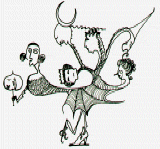 |
Antique Boxes at the
Sign of the Hygra 2 Middleton Road, London, E8 4BL, UK. PHONE: 00 44 (0)20 7254 7074 News | Buying | email | Online History of boxes | The Schiffer Book | |
|
|
| next picture| previous picture | slide show | thumbnail index page
38-39 Antique
Boxes, Tea Caddies, and Society, 1700--1880 "A mahogany veneered writing box cross banded in kingwood. This box is truly a portable desk in that it is very close in design to a desk. It has two side drawers, in the characteristic manner of a writing box, but the way it opens to reveal a number of drawers at the raised back section is reminiscent of furniture pieces designed by Hepplewhite and Sheraton. The whole look and structure of the box is similar to Sheraton's Lady's "secretaries", where he recommends the use of cross banding and has small drawers facing the user. The two side drawers are an unusual feature. Taken with the good color of the wood and the cross banding, this may be the work of Sangwine and Sons who worked in Strand in London. Characteristic of the compact furniture which was gaining in popularity at the beginning of the 19th century." "Sheraton explored bow front and serpentine shapes, as well as tambour and domed tops. These forms were very successfully translated into boxes giving an organic look which could not have been achieved with straight lines. Sheraton's decoration was within the genre of the time. He employed crossbanding, inlays and marquetry, but he also expanded the repertory of ornament to allow for more naturalistic flowers, fruit and figures. For example, his painted figures were not always drawn from antiquity. Even if the composition had classical elements, such as an urn, temple, or column, the figure could be contemporary. He even went further and designed idealized rustic figures and rather silly looking putti. Design began to move towards nature. "In his later publication of 1803, his Dictionary, Sheraton advocated the new fashion of brass inlay, which he went on to explain, was a "very expensive mode" of decorating. In his last work, his Encyclopaedia which was left unfinished on his death, he explored the Egyptian element to the limit, introducing crocodiles and sphinx heads. In tribute to Lord Nelson he also emphasized dolphins and other marine emblems."
News | Buying | email | Online History of boxes | The Schiffer Book | Request current list of available writing boxes.
|